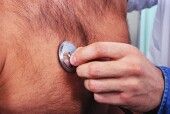Assessing the Efficacy of Algisyl-LVR in the Treatment of Advanced Heart Failure
Patients with heart failure who received left ventricle augmentation with Algisyl-LVR hydrogel implant experienced improved quality of life and functional capacity compared to similar patients treated with optimal medical therapy.

Patients with heart failure who received left ventricle augmentation with Algisyl-LVR hydrogel implant experienced improved quality of life and functional capacity compared to similar patients treated with optimal medical therapy.
Douglas L. Mann, MD,Washington University School of Medicine, Barnes Jewish Hospital, St. Louis, MO, and colleagues presented data at the 2013 American Heart Association Scientific Sessions showing positive results from left ventricle augmentation using Algisyl-LVR hydrogel implants in patients with advanced heart failure.
With therapeutic options limited for patients with advanced heart failure who become refractory to conventional pharmacological therapies, these results show this approach could be an important option for patients and clinicians.
According to the study abstract, reduction of left ventricle (LV) wall stress is considered a cornerstone in the treatment of heart failure. The injection of biomaterials into diseased myocardium has been shown to reduce myofiber stress, LV wall stress, restore LV geometry, and improve LV function in animal models.
Algisyl-LVR is a medical device that consists of a proprietary alginate hydrogel that is injected into the midwall of the LV, where it remains as a permanent implant that is intended to reduce LV wall stress and prevent or reverse the progression of heart failure in patients who have dilated cardiomyopathy. Treatment consists of approximately 10-19 injections that are spaced one centimeter apart.
In a prior phase I pilot clinical study of Algisyl-LVR in patients with symptomatic heart failure undergoing CABG, significant improvements in cardiac function and reverse LV remodeling were observed within three months.
The current study, AUGMENT-HF, is a multicenter, prospective, phase II randomized clinical trial to evaluate the safety and potential efficacy of Algisyl-LVR in patients with advanced heart failure who remain symptomatic despite being treated with optimal medical and/or device therapy. For the study, a total of 76 patients will be randomized on a one-to-one basis, with 38 patients receiving the Algisyl-LVR implants and 38 receiving optimal medical therapy. The primary safety objective is to estimate the 30-day mortality associated with the implantation of the Algisyl-LVR device.
The primary efficacy objectives are to evaluate clinical outcomes of patients receiving Algisyl-LVR when compared to patients who are receiving optimal medical and/or device therapy. At six months, patients will be evaluated for changes in peak VO2, six-minute walk test, KCCQ scores, and NYHA functional class.
Patients will be evaluated prior to the procedure, during the immediate post-operative period, and then at 30 days, three months, and six months. Patients will also be followed at the close of the trial at 12, 18 and 24 months to evaluate the long-term safety of Algisyl-LVR.
Researchers hypothesized that treatment with Algisyl-LVR is superior to standard medical therapy in the management of chronic heart failure secondary to ischemic or non-ischemic dilated cardiomyopathy.
The data presented at AHA 2013 involved 14 patients treated with Algisyl-LVR and 15 controls who were treated with standard therapy. The authors reported that the Algisyl-LVR implants were successfully performed “with no device-related complications.” They also reported observing no 30-day mortality or significant arrhythmia in the Algisyl-LVR group.
At three months, the Algisyl-LVR group showed significant improvement in six-minute walk test distance from baseline, whereas controls showed a decline at three months from baseline. The Algisyl-LVR group also experienced “a highly significant improvement” of NYHA class after three months; the control group experienced “a non-significant decrease” in NYHA class from baseline.
The interim clinical study observations support the novel concept that LV augmentation with Algisyl-LVR in the failing heart can be performed safely in patients with advanced HF, and may be lead to functional improvement in health status in these patients with advanced HF.
The Algisyl-LVR group also showed statistically significant improvement in quality of life compared to the control group, as measured by the Kansas City Cardiomyopathy Questionnaire.
Based on these results from the AUGMENT-HF trial, the authors concluded that treatment with Algisyl-LVR is safe, “with an acceptable 30-day post-operative morbidity and mortality,” and that it “leads to improvements in quality of life and functional capacity in comparison to patients who are treated with optimal medical management alone.”
Further, these studies “provide proof-of-concept for LV reconstruction with Algisyl-LVR as a potential novel new therapy for patients with advanced heart failure. Though the results are provisional the clinical trials indicate that this procedure can yield a better quality of life for advanced heart failure patients.”